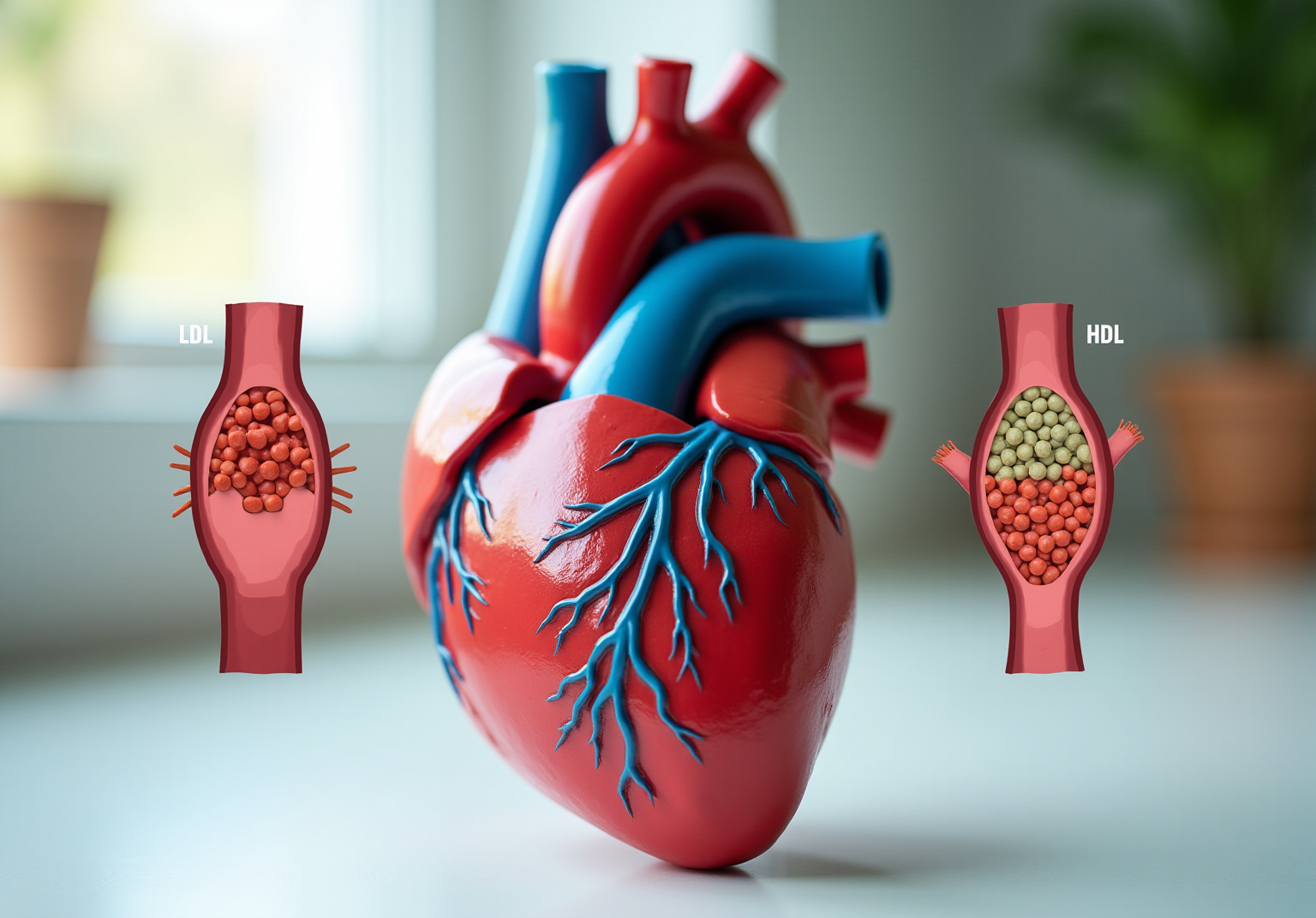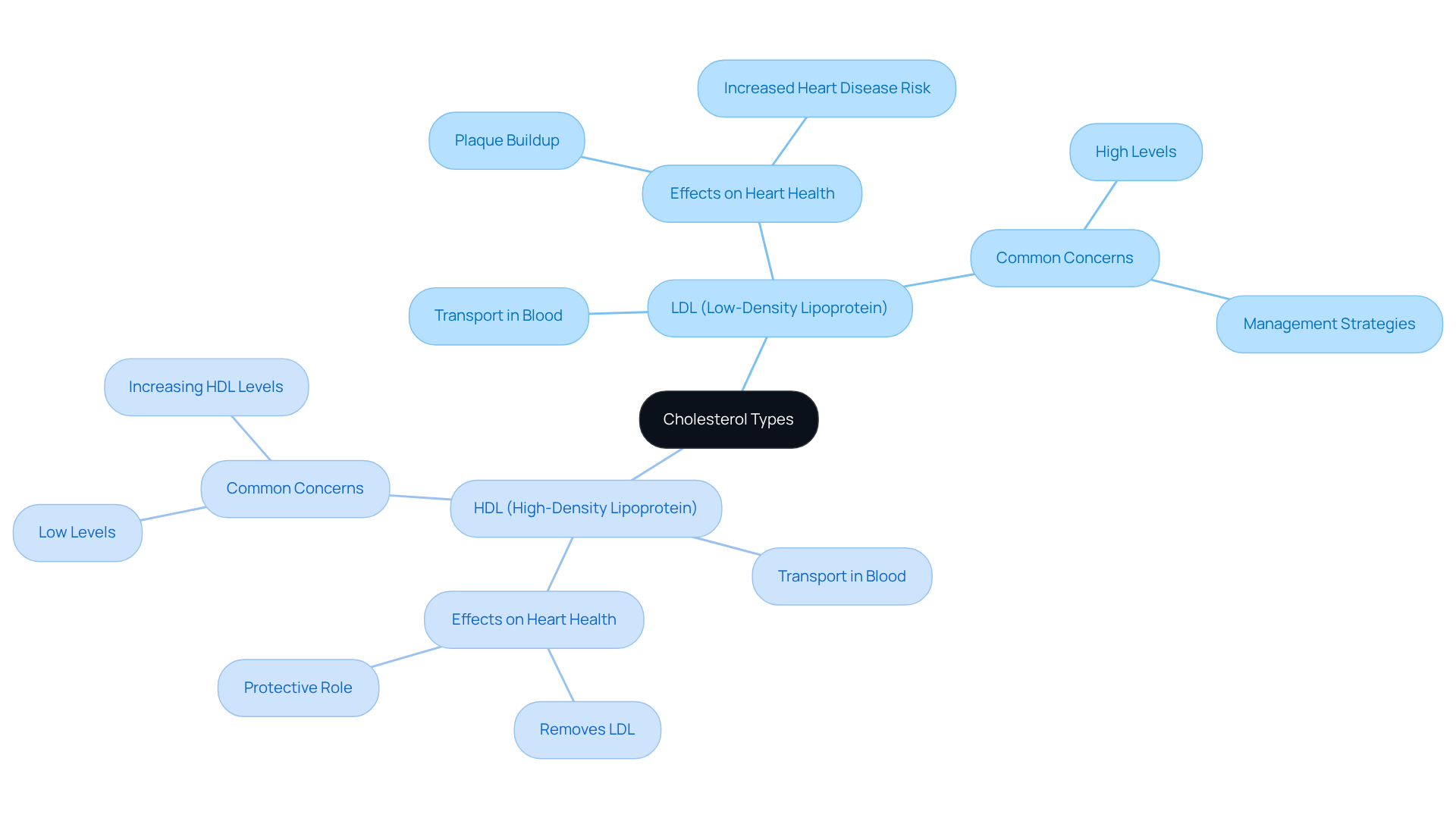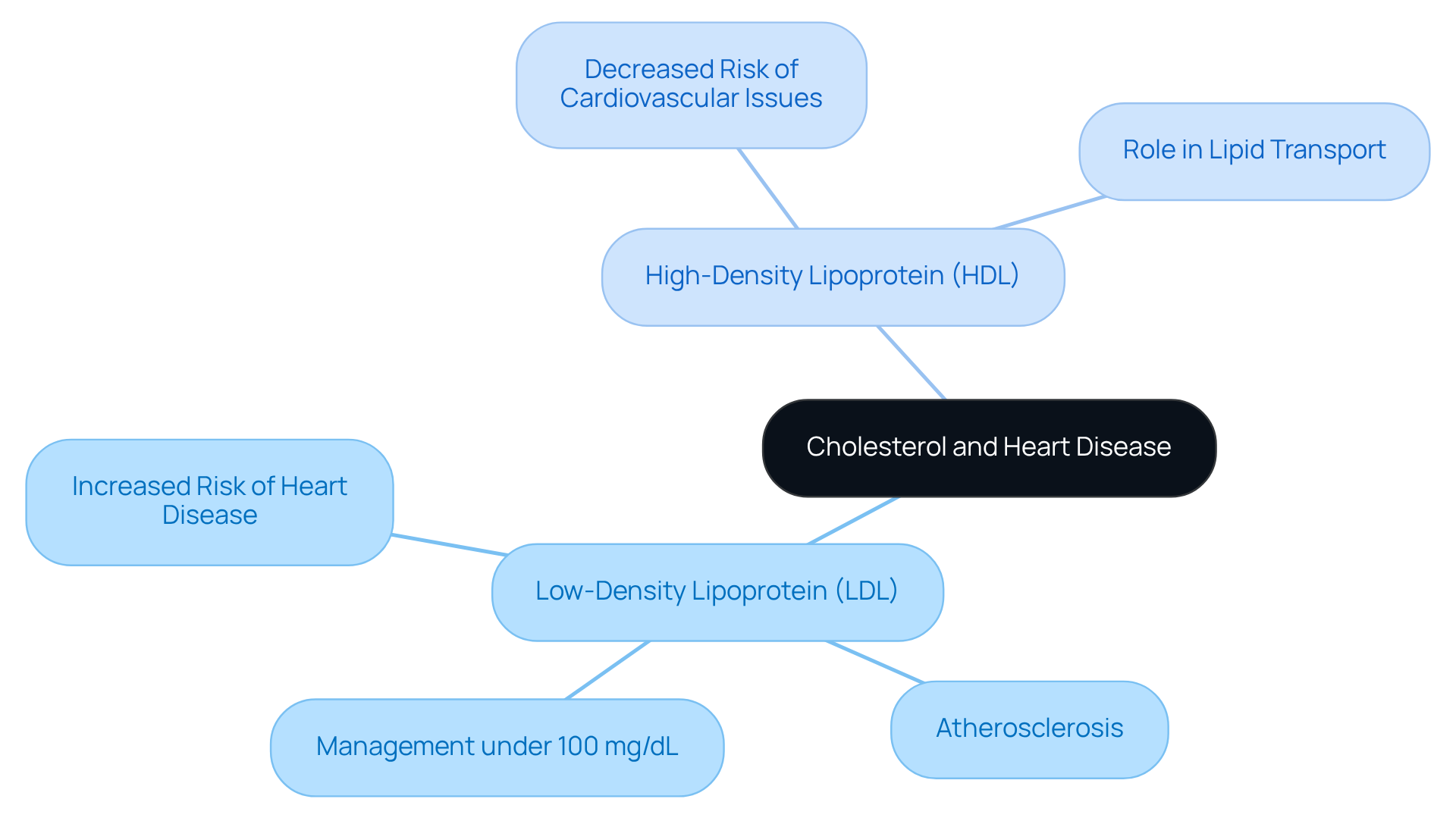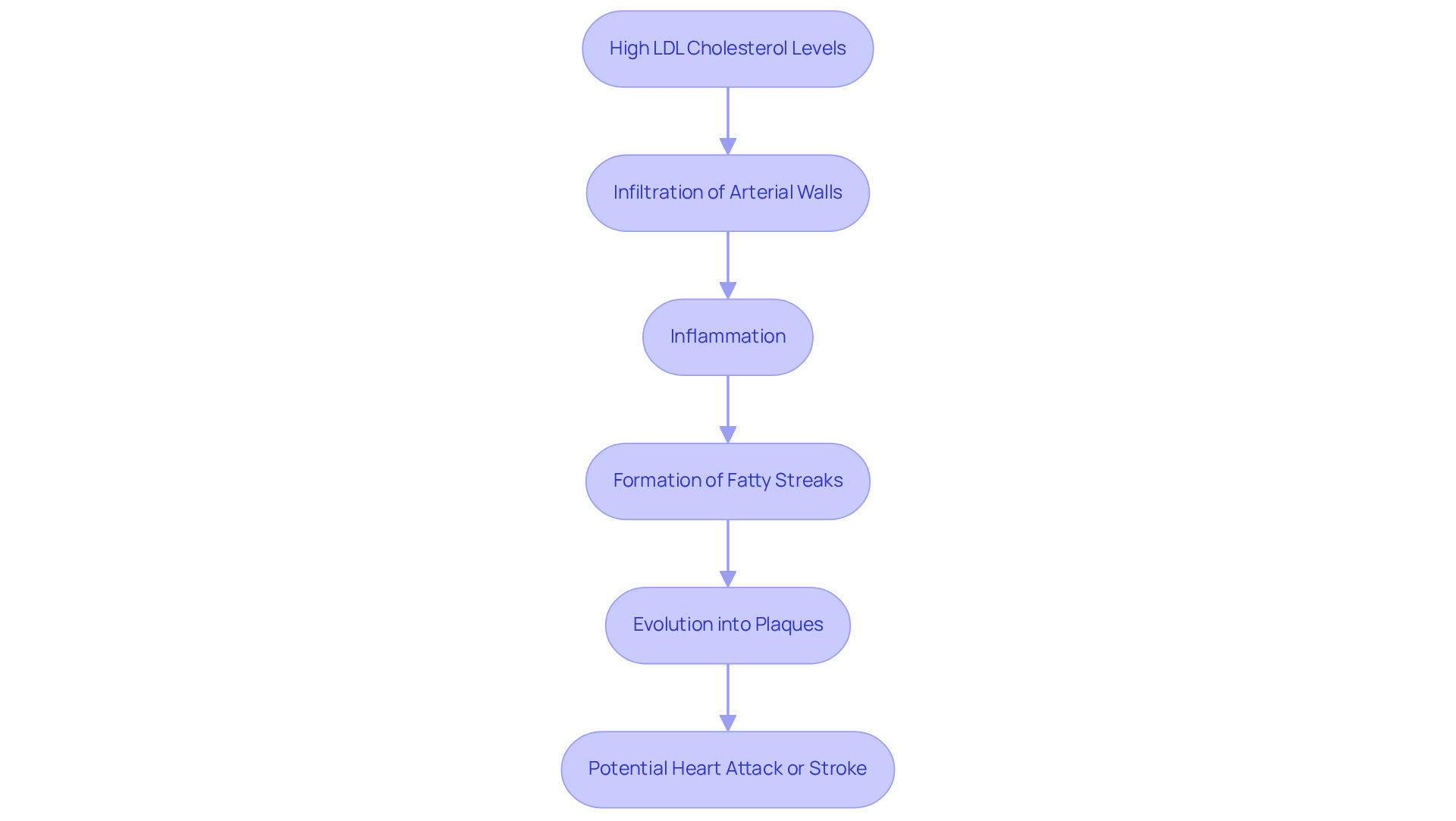


This article gently explores the important connection between cholesterol and heart disease, acknowledging the concerns many may have about their health. It confirms that high levels of low-density lipoprotein (LDL) are associated with an increased risk of cardiovascular issues, while high-density lipoprotein (HDL) offers protective benefits that can be reassuring to those worried about their heart health.
In addition to this, evidence supports the idea that LDL contributes to plaque buildup in arteries, leading to a condition known as atherosclerosis. This buildup can ultimately raise the likelihood of serious events such as heart attacks and strokes. Understanding this relationship can feel overwhelming, but it is crucial to know that there are steps to take for better heart health.
Furthermore, recognizing the role of HDL can provide hope. This type of cholesterol works to protect your heart, and knowing that there are protective factors can help ease some of the anxiety surrounding cholesterol levels. If you have concerns about your cholesterol or heart health, reaching out for support can be a positive step towards understanding and managing your health effectively.
Remember, you are not alone in this journey. Seeking help from healthcare professionals can provide you with the guidance and reassurance you need. Your heart health is important, and taking proactive steps can lead to a healthier, happier life.
The intricate relationship between cholesterol and heart disease is one that many of us find ourselves pondering, often with a sense of concern. Cholesterol plays a vital role in our bodies, yet its dual nature can be confusing. Low-density lipoprotein (LDL) is frequently labeled as 'bad,' while high-density lipoprotein (HDL) is considered 'good.' Understanding these distinctions is essential for anyone who cares about their heart health. As research continues to unfold the connections between high cholesterol and heart disease, many individuals grapple with a pressing question: does cholesterol truly cause heart disease?
This article gently explores the nuances of cholesterol types and their impact on heart health. We aim to empower you with effective strategies for prevention and management, helping you take charge of your well-being amidst the often conflicting information available. Remember, you are not alone in this journey; there are resources and support systems ready to guide you.
Cholesterol is a waxy, fat-like substance that plays a crucial role in our bodies, found in every cell. It is essential for producing hormones, vitamin D, and substances that help us digest food. However, it’s important to understand how cholesterol is transported through our bloodstream by lipoproteins, which come in two main types: low-density lipoprotein (LDL) and high-density lipoprotein (HDL).
You might have heard LDL referred to as 'bad' fat. This is because high levels of LDL can lead to plaque buildup in our arteries, which raises the question: does cholesterol cause heart disease? On the other hand, HDL is known as 'good' fat. It helps remove LDL from the bloodstream, offering us protection against cardiovascular issues. Understanding these categories is vital for assessing our heart health and finding effective ways to manage it.
If you’re feeling concerned about your cholesterol levels, know that you’re not alone. Many people share these worries, and there are supportive strategies available to help you. Taking the time to learn about cholesterol can empower you to make informed choices about your health. Remember, reaching out for help and guidance is a positive step towards better health. You deserve to feel supported and understood on your health journey.

Many individuals share concerns about their heart health, questioning does cholesterol cause heart disease, as studies have consistently shown a significant association between high levels of low-density lipoprotein (LDL) and an increased likelihood of cardiovascular disease. The accumulation of LDL fats in the arterial walls contributes to atherosclerosis, prompting inquiry into whether does cholesterol cause heart disease, a condition that leads to the hardening and narrowing of arteries. This can ultimately result in serious events like cardiac arrests and strokes, leading to concerns about whether does cholesterol cause heart disease, which can be quite alarming.
On the brighter side, increased amounts of high-density lipoprotein (HDL) are linked to a lower risk of cardiovascular issues. HDL plays a vital role in transporting lipids away from the arteries, promoting better cardiovascular health. Recent research indicates that maintaining LDL levels under 100 mg/dL is crucial for reducing cardiovascular risks, which raises the question of whether cholesterol does cause heart disease, especially for those already facing cardiac conditions or diabetes.
Furthermore, experts emphasize the importance of comprehensive risk assessments that take into account both LDL and HDL levels, along with lifestyle factors, to address the question of whether cholesterol does cause heart disease. This holistic approach helps in tailoring effective prevention and treatment strategies. Understanding these dynamics is essential for both patients and healthcare providers in their shared pursuit of optimal cardiovascular health. Remember, you are not alone in this journey, and support is always available to help you navigate these health concerns.

Elevated levels of fats in the blood raise the important question of whether cholesterol does cause heart disease, primarily through a process known as atherosclerosis. When LDL cholesterol levels rise, it raises the question of whether cholesterol causes heart disease by infiltrating the arterial walls, which leads to inflammation and the formation of fatty streaks. Over time, these streaks can evolve into plaques, potentially limiting blood flow and increasing the risk of blood clots. If a plaque were to rupture, it could result in a heart attack or stroke, which is understandably alarming.
Moreover, high lipid levels can contribute to endothelial dysfunction, affecting the blood vessels' ability to dilate and raising blood pressure. This further heightens cardiovascular risk, making it crucial to monitor and manage cholesterol levels effectively, as many wonder whether cholesterol does cause heart disease. At Amavita Cardiovascular Health®, we understand how overwhelming these concerns can be. We offer advanced imaging and comprehensive cardiac assessments tailored for high-risk patients, including those with diabetes, hypertension, or a family history of cardiovascular issues.
Our advanced imaging capabilities provide precise insights into your cardiovascular health, ensuring that your care is personalized and effective. We are here to support you with preventive strategies designed to significantly lower the risk of cardiac events, addressing common concerns related to heart health through minimally invasive treatments. Your overall well-being is our priority, and we are committed to helping you navigate your health journey with compassion and expertise.

Managing elevated lipid levels can feel daunting, but you are not alone in this journey. By making some lifestyle changes and, if needed, using medications, you can take control of your health. Start by embracing a heart-healthy diet that includes plenty of fruits, vegetables, whole grains, and healthy fats. It’s also important to cut back on saturated and trans fats.
In addition to these dietary changes, regular physical activity and maintaining a healthy weight play a vital role in your overall well-being. Remember, avoiding tobacco smoke is crucial too. For some individuals, particularly those with significantly high lipid levels or existing cardiovascular conditions, medications like statins may be recommended to help lower LDL lipids.
Regular monitoring of your cholesterol levels is essential to evaluate how well these strategies are working and to make any necessary adjustments. By taking these proactive steps, you can significantly reduce your risk of heart disease, leading to the inquiry of whether does cholesterol cause heart disease. You have the power to improve your health, and support is available every step of the way.

Understanding the relationship between cholesterol and heart disease is essential for maintaining cardiovascular health. Elevated levels of cholesterol, particularly in its LDL form, pose significant risks, leading to conditions such as atherosclerosis. On the other hand, HDL cholesterol offers protective benefits, emphasizing the importance of balancing these lipoproteins to mitigate heart disease risk.
This article delves into how high cholesterol contributes to heart disease, illustrating the process by which LDL can infiltrate arterial walls and lead to serious health complications. Regular monitoring and proactive management through lifestyle changes, along with medical interventions when necessary, are vital. By adopting heart-healthy habits, you can take control of your cholesterol levels and reduce your risk of cardiovascular events.
Ultimately, the insights presented underscore the significance of understanding cholesterol's role in heart health. It is crucial to remain informed and proactive in managing your cholesterol levels, as doing so can lead to improved health outcomes and a better quality of life. Seeking support and guidance on this journey is essential, as the path to optimal cardiovascular health is a shared endeavor. Remember, you are not alone in this; together, we can work towards a healthier future.
What is cholesterol?
Cholesterol is a waxy, fat-like substance that is essential for producing hormones, vitamin D, and substances that aid in digestion. It is found in every cell of the body.
What are the types of cholesterol?
The two main types of cholesterol are low-density lipoprotein (LDL) and high-density lipoprotein (HDL).
Why is LDL cholesterol referred to as 'bad' fat?
LDL is considered 'bad' fat because high levels can lead to plaque buildup in the arteries, which may increase the risk of heart disease.
What role does HDL cholesterol play in the body?
HDL is known as 'good' fat because it helps remove LDL from the bloodstream, providing protection against cardiovascular issues.
How can understanding cholesterol types help with heart health?
Understanding the categories of cholesterol is vital for assessing heart health and finding effective management strategies to maintain healthy cholesterol levels.
What should I do if I'm concerned about my cholesterol levels?
If you're concerned about your cholesterol levels, know that many people share these worries. It's important to learn about cholesterol and consider reaching out for help and guidance to support your health journey.